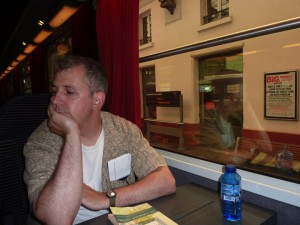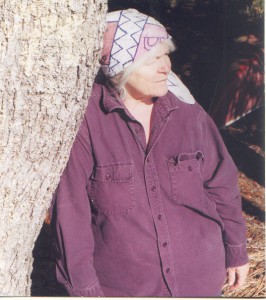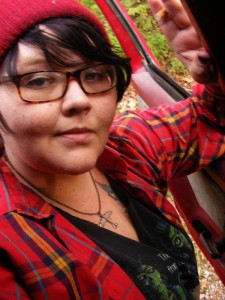The Cabin is one of those bars that has at least three pick-up trucks parked on the side no matter when, and inside it's dark and smells like beer as though a fine party had gone on the night before, and the place hasn't been aired out so there's a head start on the next good time. Just after my divorce, when Bill left with the television, I used to come here to watch Jeopardy. I'd bring my daughter Rose Lee along, little as she was, and felt fine about it. Now I come here with my friends Mary Beth and Janice, I pay no mind to what's on the tube, and Rose Lee is just old enough to buy herself a legal drink.
The TV over the bar is always on, but unless it's a big game, nobody seems to look up at it. They might as well save the electricity. Weekend nights when there's likely to be dancing, the volume's turned down some, but even when somebody feeds the jukebox quarters the TV plays. In spite of the ladies' entrance, which no one ever uses, this is pretty much what the town has to offer in way of a night out.
Pete brought Jeff over to where we were sitting around a table and introduced us. Good looking. Freckles. Construction. Union. "I told Jeff that you ladies would make him feel right at home. Now don't go making a liar out of me."
Mary Beth kicked me under the table. So did Janice. Jesus. You'd think that no new men ever come to town. That we didn't know any first- rate men at all. All right, so if I'd been in a different mood, maybe I would have done a little kicking myself, or maybe even been willing to play a little footsie. But I’d just read another self-help book, and I’d given up on bad relationships, and I wasn't sure I was in the right mood for a good one.
Pete smiled. Jeff beamed. The three of us girls smiled right on back. My heart wasn't in it. I almost expected the draft from the fluttering eyelashes to blow the napkins off the table.
Or it might have been that last week was my old anniversary, reminding me how my ex-husband had come to town to do construction work on the new bank building where Rose Lee now works as a teller. We'd had a romance and got ourselves a head start on a family; no matter what else, I've never been sorry to have Rose Lee. Bill left fifteen years ago when she was seven, sent support checks regular until her twenty-first birthday, and doesn't live so far that they can't see each other.
But he stays far enough away from me so that now Rose Lee is grown he's no bother in my life at all. He's been a model ex-husband, and I don't regret his going. Past is past, but sometimes why I'd loved him so comes back to me like heat lightning in the evening sky.
Pete and Jeff went to get drinks for our table. Both of them were built sturdy. Pete's hair had gone gray early, and he had a bald spot that I used to like waking up to. In the last twenty years with the town small as it is, he had spent a while with each of the three us, and though he wasn't one to kiss and tell details, at least not any more than we would, we supposed he would have said a few kind words about us to Jeff.
"What are we supposed to do, draw straws?" asked Janice.
"I don't think we'll have to do that." Mary Beth said taking Janice at her word. "And when was the last time you saw a straw in a drink here?"
"I'll sit this one out," I said.
"Pauline." When they get on my case like this they kind of drag out the last part of my name so that it has three syllables. "What's wrong with you?"
"Nothing. I want to keep it that way."
"Well, he seems nice enough."
"He hasn't said five words. Jack the Ripper would seem nice enough after just five words."
"Oh, give him a break."
"Give me one, will you."
When Pete and Jeff came back we changed the topic and made small talk about Clayton. Jeff dropped crumbs of information about himself on the table as though he were feeding fish and waiting for them to rise to the surface to nibble.
Thirty-eight.
Divorced. Once.
One boy, eighteen, photo in wallet.
Can cook for himself.
Misses a woman's home cooking.
It was past midnight until I realized that Jeff was the kind of man I'd been warning Rose Lee about since she was old enough to say something about what underwear I put on when I had a date.
I was the first to leave. As I got up from the table, so did Jeff. He stood there, smiling at me, telling me with his eyes all the lies a woman wants to hear even when she knows better.
And that's how things began.
"What about your ex-husband?" he asked after our first night together. He stroked my hair at the temples, following the path where the soft brown would sprout silver wings in a few years if I took after my momma.
"Gone."
"That's it? Four letters. G‑o-n‑e?"
"Oh, there's more to him than that." I couldn't see dragging my history out where it would clutter up the nice clean surface of our new relationship. He'd learn what he needed to as time went on. I suspected he was just poking to see whether what I told him jibed with what he'd heard from Pete. Men can be sneaky when they're figuring out what they want to do with a woman and for how long.
We got through mud-time just fine and all through the spring we watched the little leaves unfold and the blue wash back into the sky. We did the usual things–weekend nights at the Cabin or the movies, suppers and TV at home, and occasional weekend breakfasts at the Circle Diner where Jeff liked the hotcakes and eggs with sausage. We talked about firing up his gas grill, but hadn't quite got around to it. What happened was fine, and what didn't happen didn't seem to matter. I wanted it to go on and on like that, easy, our time together a loose weave. Our love-making was comfortable, always, and sometimes for me, being with him that way was like walking into a fancy hotel room and finding a fresh-made bed turned down to welcome me into it and with a gold-wrapped chocolate on the pillow, too.
My momma had always warned me that life gives you what you look for, so I tried not to look for trouble. I preferred having trouble sneak up behind me, tap me on the shoulder, tip his hat and say, "Pardon me, Ma'am…" So I thought everything was perfect until Janice and Mary Beth were shopping over in Bridgeton and told me they'd seen Jeff, walking out of the Hilltop Tavern with Rose Lee's friend, Delia. And since he'd taken the trouble to go twenty miles for lunch and never mentioned it to me, I figured he had something to hide. From then on I watched to see how he acted with her, and I didn't much like what I saw. He stayed sweet as pie with me as long as I could pretend not to be noticing that sometimes he didn't call when he said he would and that he'd be out when I'd call him back after an early phone call.
For hours we'd been having a silent fight, you know the kind. Neither one of you admits something is wrong, because you know that what's wrong is something you don't want to acknowledge. It's like an animal has gone and died in the wall and the smell is there, and you think that if you pretend to ignore it, it will go away, but it doesn't, at least for a long time. And what makes it bad is you know there's nothing you can do about it anyway. And even after you can only remember how it smelled, if you think about it at all, you know the little bones are walled up somewhere in your house.
I should have known not to argue with a man who has just stepped in dog shit and tracked it over his kitchen floor before he'd smelled trouble.
I watched him toss his sneakers into the yard, probably smashing the geraniums I'd planted. Wearing his pathetic white socks, he used wads of paper towels to wash the mess up from the floor. He put the paper towels in the garbage. Then he filled the sink with detergent water, and then he went out back with the garbage. He came in carrying his sneakers by their laces. He held them over the sink for a while before he carefully lowered them into the suds.
Up 'til then I had been pretty quiet. After the bad time we'd been having, I thought it would be better to hang back from this whole event. I watched the sneakers disappear into the sink where I'd fixed the salad for dinner and where I had expected to get the water for morning coffee. I suppose I must've made some sound, because he wheeled around and snapped at me, "Did you say something?"
And then I said, "A bucket might be better."
We had a discussion on sanitary habits that had an awful lot to do with how I felt that he'd been paying too much attention to Delia and how he felt that I had no right to care about what he did with his time when he wasn't with me. But instead we said:
"They'll be easier to scrub in the sink."
"We use the sink for food."
"People put sneakers in the washer where they put sheets and towels. You can clean a sink easier."
"It's just not real appetizing, is it?”
"Clorox will disinfect the sink just fine."
"Do you have Clorox under there?" I knew he did. The kitchen and bathroom often stank of Clorox which he used full strength.
"I'm just going to let them soak."
"What about the dishes?"
"They'll wait. Don't you ever do wash in the sink?"
"Are you comparing my underwear to dog shit?"
Sometimes I'm surprised how much tension a little infidelity can cause.
A few days later, I took a long lunch to try to make it up to him and then I wished I hadn't been in the room when Delia called. I was sorry that I'd heard him talk to her, seen him brighten up like a polished teakettle so shiny I could see her face in it next to mine, with both our faces pushed out of shape for being there together.
When I answered the phone I could have told her that she had the wrong number, but I was sure she'd just call back and he'd be mad at me. Besides, she knew who I was, and I didn't want her telling everyone that I had tried to fool her. I suppose she didn't expect me to be at his place when I ought to have been working down at Clark's market.
So now Delia knew that he'd sweet-talk her right in front of me. That would make a good story that any one of the three of us could tell. It was a story I had sworn I would never be in again.
I hoped Delia wouldn't say anything to Rose Lee. I wanted to be able to talk to her myself first. All through lunch that day after the phone call I'd sat staring at the pots of hot pink geraniums in the noon sun, hardly looking at Jeff at all. I tried. Over his shoulder the flowers pulled my attention away from his eyes, which I couldn't have seen anyway he was squinting so much. He almost never wears sunglasses, being vain about his hazel eyes and long lashes. Unless it's for one of those times when he can be dramatic and take off his aviators real slow, he wears them pushed up on his head where they take the light and bounce it around. For the rest of the summer, whenever I saw geraniums I felt queasy.
These were the geraniums I'd brought to him and put in big white pots with ageratum to brighten up his yard a bit for times when I'd be here and especially for times when I wasn't. Male dogs piss on trees to mark territory and women plant flowers. For all the good it does.
I tried not to blame Rose Lee for this. Of course it wasn't her fault that Delia had pushed her way into my romance. I still like to say that she pushed her way in, but I know that's not what happened.
It's about two months now since Rose Lee told me about how Jeff had come over to the girls' booth at the Cabin, carrying his glass of beer. He smiled one of his wonderful smiles and plonked himself down next to Rose Lee who pretty much on instinct slid over and made room for him. For the rest of the evening he'd turned the charm on both of them. Rose Lee, who should have heard enough about men, my men, to make her wary, came home with the story happy as though she was bringing me homemade jam.
She'd introduced him to Delia as my boyfriend, and after that, she took all that happened as pure friendliness. I might try to take some comfort that she's still so innocent. I knew there was trouble when she said, "I'm sorry for what I've been saying about him, Mom. I can see why you like him so much."
"Well, can you now." I said. "I'm real glad to hear that." I tried not to be too sarcastic.
For all the times Rose Lee and Jeff have been thrown together he'd never done much to charm her, so I knew right then that the high beams had been for Delia.
Jeff is only a couple of years younger than me, nothing to raise an eyebrow even in this town, and Delia, who's got five years on Rose Lee, has never put up age limits on her beaux. When Rose Lee started hanging with her, I was worried, until I reminded myself that Rose Lee had never gotten into trouble while she was coming up, and with me as her mother at that. I kept my mouth shut, hoping they'd drift apart, but working together in the bank they stayed tight.
For the last couple of weeks Rose Lee hasn't talked much about Delia, and she's done a tap dance rather than answer any questions about her. And as for me, I guess I have been ignoring one of my major rules, never to ask a question I don't want the answer to. Without knowing it Rose Lee was giving me the answers to all my questions, and I was kind of sorry I had been asking.
I kept having a dream of seeing Jeff with Rose Lee and Delia. Jeff had his arm draped over each one, their arms wrapped around his waist, reached down and into his back pants pockets. I could feel them bumping together as they walked down the street with me caught behind them with no way to pass. The ground had opened up behind me so I couldn't turn my back on them and walk away.
I took to making a record of all the times things didn't match up–what Jeff said, what I heard, and what I didn't hear from Rose Lee. It isn't like me to write things down, but when I felt crazy, I used a pack of index cards I brought home from Clark's school supplies, headed each with a date and wrote down what didn't line up. I hid these from Rose Lee and kept them in with a pair of my shoes she wouldn't be caught dead in. Sometimes when she's gone and I'm alone, I spread them out on my bed to get a real good look all at once at what's happening.
One afternoon I spent some time with my index cards and then went to cook dinner for Jeff. I heard a man on the radio say what Alabama's death row was, you sit alone in a hot room until it's time for them to take you out and fry you. Sometimes I worry my life might get like that. What happened was this. Jeff and I were sitting at supper in his kitchen and I was showing my unhappiness by eating almost nothing. He was praising my chicken concoction, and I knew I was getting on his nerves. He kept urging me to eat, and I kept smiling and picking at my own good cooking. Good cooking was a matter of pride with me although I had no illusions that the way to a man's heart was through his stomach; for the men I knew that would be aiming too high.
He'd worked his way through the chicken and corn and the tossed green salad and had got to the homemade blueberry pie. He was telling me what had happened that day on the construction site, and I was asking the sort of questions that showed I wasn't really paying attention. I kept asking him to repeat ends of sentences and asking him to tell me again who had said what.
I imagined Jeff taking Delia to lunch at the Hill Top, Delia wearing her hot pink mini skirt with red patent leather spike heel sandals, her nails painted a pale green to set off the pink and red. I could see Jeff open the car door for her so he could help her up on the curb, him bending down, enjoying the good view of her legs. Their fingers brush together. Then he watches her sashay after the hostess. I could hear him urge her to have a shrimp cocktail. She dips the jumbo shrimp into the cocktail sauce, tilting her head back slightly as she opens her mouth to eat them with those green-tipped fingers of hers. She leans forward, "Mmm…" she says, "Good." Shrimp! No wonder he's been so willing to take me up on all my offers of home cooking, with him buying Delia jumbo shrimp for lunch.
And all the while I was pushing food from one place on my plate to the other, which is easy enough with chicken and salad but is pretty hard to do with pie. Jeff didn't usually tell me anything much of what had happened during the day so tonight's story must have taken real effort on his part. I supposed he thought hearing about how a load of bricks got moved would take my mind off him and Delia. Or maybe it was a gift to me. I don't know.
He was about to help himself to a second slice of pie and I was about to get up for some ice cream for him. This wasn't kindness on my part or even habit of setting out to please.
Then Jeff got up and, without a word, went to the cabinet under the sink counter where he kept the pots and bent way in. He came out holding the mouse by its tail, its legs caught on a glue board. I hadn't heard a thing, but I suppose he'd heard a squeak or its tiny little struggle.
I'd had enough of trouble with men in my life to recognize the expression on Jeff's face, so I let out a long wailing "No" and ducked. I didn't hear a splat or thud, what with the sound of my protest, and then I looked up.
Jeff just stood there by the sink, still holding the mouse by its tail. He had a look on his face as though he'd been slapped by some stranger. He lifted the lid off the trash and dropped in the mouse.
I listened for its muffled scrabbling. Nothing. I knew enough not to do more than murmur, "I'm sorry." I couldn't ask him, "Why, of all the girls in town, do you have to chase after Rose Lee's best friend? Aren't my friends good enough for you?”
I could tell he wouldn't try to stop me as I left, and I was careful not to slam the door. I was sure I'd be talking to him tomorrow, but judging by his face, he wouldn't be throwing much of anything at me for a while.
If it hadn't been for feeling sorry for the mouse, I suppose what happened could be kind of funny if you have the right sort of sense of humor. Rose Lee wouldn't see the joke in it, and I decided that I'd best not mention what had happened tonight. By the time I'd driven home I'd have some story ready to tell her to explain why I hadn't stayed over. I didn't like to tell outright lies, so I planned to shuffle around until she assumed we'd had a squabble about something unimportant, and I'd come home for some peace. The fact is, my leaving had nothing to do with the mouse. We could have made that up easy enough.
My life is not a movie, and so when I came home, I didn’t expect to find Delia sitting with Rose Lee at my kitchen table, with a half-empty bottle of Jack Daniels for a prop. Rose Lee and Delia had identically painted frosted mauve nails each with a silver star on the ring finger. The nail polish and the sheet of appliqué nail decorations sat on the table right by the Jack Black. The light was good in the kitchen, and I could tell from the way they held their hands that they'd just done each other's nails.
Rose Lee was looking more like me these days. "Rose Lee, " I said, and after just a heart-beat's pause, "Delia."
"Momma," Rose Lee said, not at all apologetic for what she'd brought into our kitchen.
"Pauline," said Delia, smiling as though she belonged here without my invitation sharing my whiskey and my boyfriend with me, sharing a bottle of nail polish with my daughter.
I hadn't been this near to Delia since she'd started seeing Jeff, so I took a hard look at her hennaed hair and her peacock-blue eyes. The story around was she didn't need the contact lenses to see.
"You're home early," said Rose Lee.
"Mmmm," I said. I poured myself two fingers of the whiskey, but I didn't sit down.
"Momma," said Rose Lee, talking just as stern as I'd ever spoke to her, "when will you ever realize that Jeff is a jerk?
I was glad she'd used the old-fashioned word. Still, I didn't like hearing what she was saying, especially while Delia was listening, though I'd had some thoughts along those lines myself.
I wondered whether Delia or I would defend him, and then I considered what would happen if I dumped mauve nail polish into Delia's hennaed hair, but I knew that I wanted Rose Lee to stay at home for a while longer, and an assault on Delia wouldn't help keep her here. I would have to be on good behavior.
But at least I was going to enjoy telling Janice and Mary Beth about this.
"Pauline," Delia's voice was just the least bit blurred. "I never meant any harm." She looked, for a moment, like a repentant child until her face lit with a grin that reminded me why I had worried that she'd be a bad influence on Rose Lee. "But then again, to be honest, I never gave it much thought."
I wondered how that could be true when she was with Rose Lee so often and they seemed to be so close, but then maybe some women are born without moral sense, the same as men, and Delia could be one of them.
"Delia," I said, sitting down, "I'm not sure I want to be having this discussion with you."
"I understand that," she said. "But it can't hurt now. Under the circumstances."
"Your friendship with Rose Lee?" We both looked over at her.
Rose Lee had the grace at last to look embarrassed.
"I didn't mean that, but yes." She paused. "It's just, didn't you know, I'm not seeing him any more."
I did all three of us the favor of not asking how I was supposed to know. "Oh," I said, with the faintest lilt rocking my statement towards a question.
"It wasn't much fun."
Not much fun. I told myself that she was twenty-seven.
"I can't say nothing ever happened." She was almost sulking.
Well, at least she wasn't a liar, too.
"But one thing you ought to know. He never once even mentioned your name."
"Thank you, Delia." Maybe twenty-seven wasn't so young, then, if she could realize that although he'd slept with her there was one worse betrayal I hadn't suffered. "I am glad to know that."
I supposed Rose Lee could do worse in friends and, after all, I could do still worse in men.
Saturday night that week a crowd was at the Cabin having Clayton's version of a good time. This time last year I was free. I'd go out to the Cabin with the girls on Friday nights, and sometimes on Saturday, too. And the usual guys would be there to buy us an occasional pitcher and from time to time slide us across the floor. I had no one special like Jeff to make love with, or to cry over. I figure that five years from now I'll still be working at Clark’s, coming regular to the Cabin, and I'll watch Jeff do his version of a slow dance, his hips glued to Janice or whoever. And maybe if I'm lucky, some nights instead of coming here I'll stay home and watch TV so Rose Lee and her husband can have a night out.
Jeff picked up his beer and stared down at the ring of water on the varnished table, deliberately replacing the glass several inches away. For some time he did not look at me, as though what he was doing took all his attention. He drew outward lines from the circle, then, finally, looked up at me and smiled. "Sun," he said, "Sunshine. You are my."
"Am I?" I looked down at what he'd drawn. "Am I really?"
"Sure you are, Sugar." he replied. With the flat of his hand, he swooshed across the sun he had made, so that only a wet smear remained.
I looked over his shoulder across the room to where Delia was sitting with Rose Lee. I caught Delia's eye and winked. She winked back and Rose Lee waved to me and I heard him say, "Really and truly. My one and only. Yesterday, today, tomorrow." He held his hand out across the table and I put mine in his. He traced a soft wet path from my wrist bone to my ring finger and all the way down over its frosted mauve nail where a tiny silver star caught all the light there ever was.
A collection of my flash, Just Desserts, was published by Star Cloud Press in 2010. I have three collections of poetry, the most recent of which is Taking Stock (Star Cloud 2011). My work, which has been nominated five times for a Pushcart Prize, has been published in or is forthcoming in such places as Shenandoah, The Dead Mule, Southern Hum, Eclectica, Thieves Jargon, Underground Voices, Frigg, and Boulevard. I'm a contributing editor for Boulevard and a founding editor of Per Contra.
I teach creative writing and literature at Drexel University, where I also co-direct the Certificate Program in Writing and Publishing.














